#Religion and Magic
Text
“Wicca Bashing” Round 2: The Double Standard Of Always Shitting On Wicca But Not TradCraft
What ultimately utterly baffles me the most about the community's constant desire to pull down its pants and crap on Wicca, is that Robert Cochrane (Roy Bowers)?
Was also "A White British Man".
Also claimed the exact same "hereditary Witch Cult" nonsense.
Also created his own Witchcraft Tradition.
In the formation of Cochranite TradCraft, Robert Cochrane (Roy Bowers) also appropriated a lot of practices from other traditions and mythos he shouldn't've. And the tradition is, frankly, a hell of a lot more sex-centric within some strains than Wicca ever is- and that sex-centrism is blatantly erotic and hypersexual, rather than Wicca's focus on the fertility of the land via the Gods. He also decided it too requires initiation to enter his Tradition (even if the Initiation mechanisms are different).
Ultimately Cochranite TradCraft shares a lot of similarities of belief and practice to Wicca. And that's thanks to Cochrane literally having (at least) a 1st degree initiation into Wicca and one of its second major contributors being Doreen Valiente (a Wiccan High Priestess).
Not to mention the Traditions that outright do blend both openly and exist in a weird grey spot that's not quite one or the other. Or the open cooperation of people from both traditions to create materials for both- such as Ed Fitch and Joseph Bearwalker working together to create "The Pagan Way" to meet the demands for outsiders to both traditions. Or, like, y'know, Doreen Valiente whose contributions routinely get ignored and swept under the rug because pissing contests over which White British Man is "The Worst Actually" are more important I guess.
And yet TradCraft is always seen as "more legitimate" than Wicca, and gets absolutely none of the same hyper-policing or discussion of "Red Flags" and dangers, skepticism, outright lies made up about it, (Aleister Crowley and Gerald Gardner co-created Wicca exclusively to groom young hot women into having sex with them? Really? Really ????) etc, that Wicca does. Even despite sharing so many of these very specific similarities of both creator and their creation, structure, and praxis across its own (equally independent) strains of Tradition.
It's almost as if there's a massive double standard and bias in this community about who we police and who we don't ... And once again I have to tell people to pay attention to the crap that lays on their own side of the fence before complaining that their neighbor's yard stinks. Because these problems are not problems with individual groups, but with the community as a whole for a variety of reasons- and it's time to stop assigning all the blame to one singular group and acting like only one of us is "The Worst Actually".
None of us are "The Worst", actually. We all have shit in our own yards to deal with- and a lot of that shit was made by the same group of Dogs howling the same tune at the same damned moon. And we all need to deal with that collectively; this whole "Piss on one another all the time" thing is getting so goddamned old.
Like ... Are y'all not tired of acting like absolutely unnecessarily petulant and petty Toddlers over things, yet? Can you not grow up, stop acting like panicked Evangelist Protestants every 5 seconds, and actually act like the damned adults you're supposed to be, capable of having reasonable discussions already? I know I'm tired. Why aren't the rest of you already?
This is an opinion piece based in 20+ years of experience and research. If you found this helpful or interesting, please consider Tipping or Leaving a Ko-Fi; even $1 helps
This account is run by a Dual Faith «(Converting) Masorti Jew + Traditional NeoWiccan» & «Ancestral Folk Magic Practitioner» with 20+ years of experience as a practicing Pagan and Witch. If that bothers you, don't interact.
#Original Content#Original Witchy Content#2023#Wicca#NeoWicca#Paganism#Eclectic NeoPaganism#Traditional Witchcraft#TradCraft#The Crooked Path#Religion and Magic#Witches of Oklahoma#Pagans of Oklahoma#Oklahoma#Ancestral Connections
12 notes
·
View notes
Text
The Difference Between Magic and Religion
In several posts, I've mentioned that religion and magic are distinct; however, I've never explored why this blog distinguishes the two in a long-form post like this.
So let's dive in.
Let's start with a definition of religion. This time I'll use Merriam-Webster:
"1: a personal set or institutionalized system of religious attitudes, beliefs, and practices
2:a: (1) the service and worship of God or the supernatural
2:a: (2) commitment or devotion to religious faith or observance
2:b: the state of a religious
3: a cause, principle, or system of beliefs held to with ardor and faith
4: scrupulous conformity"
Perfect. Now let's define magic. Instead of using any dictionary, I'll use Aleister Crowley's definition from Book 4:
"The art and science of causing change to occur in conformity with Will."
It would be easy to stop here. Different definitions, different topics, right?
It's more complex than that. Look at definition 3 for religion. Isn't magic—in its own way—a system of beliefs held to with ardor and faith?
This isn't some sort of "gotcha" moment; it's an illustration of the difficulty in separating the two. It gets even harder to distinguish between them when many religious traditions incorporate magic as an integral part of their tradition.
In this blog's opinion, the most clear modern attempt to delineate religion from magic comes from the chaos magic movement. If you're unfamiliar, the basic tenet of chaos magic is that belief is a tool. Chaos magicians—by and large—believe that there are ideas and techniques common to all magical systems. It follows, then, that religious frameworks are simply lenses through which these techniques are understood and used.
This is obviously a contentious statement, but there is some truth to it. There are some common ideas and techniques to some magical systems. However, chaos magic is distinctly Western, even if they incorporate Eastern philosophies.
Why is it distinctly Western? Because a central goal of chaos magic is to reach something called the Gnostic State. This empty mind, when properly harnessed, can be wholly directed towards a magical goal. It's a classic example of the focused, intense attachment required by Western magic.
Okay, so despite the fact that I just engaged in diatribe against chaos magic, I want to emphasize that it does make an excellent point: your belief is central to magical success. This belief tends to stem from chaos theory, which states that the apparent randomness of the universe is due to infinitely complex combinations of co-dependent cause and effect. Magic hijacks that cause-effect chain and alters it towards a desired goal.
Here's where it gets dodgy. Often times, this logical path leads to some form of connection with creation itself—after all, if everything is connected, doesn't that have heavy psycho-spiritual ramifications? And in an attempt to understand those ramifications, do we not typically turn to (or build) religious traditions?
It's exactly that thought process (not to mention the high compatibility between these two topics) that makes it so difficult to distinguish the religion from magic. So often we conflate the two as composite components of a singular worldview.
And that's not a bad thing. It becomes an issue when we fall into heavy dogmatism and believe that our way is exclusively correct. That line of thinking leads to staleness and atrophy of spiritual experience. Remember that magic and religion are both living traditions, meaning that they transform over time and through the people who practice them.
So what is the actual difference? I think it's a pretty nebulous distinction, but I'll take a crack at it:
A religious tradition gives a transcendental experience via a being-to-being (verb to verb) relationship between the divine and non.
A magical tradition gives a transcendental experience via a being-to-goal (noun to noun) relationship between the magician and an end.
But even this has its complications. For example, the main goal of many ceremonial magicians is the Knowledge and Conversation of the Holy Guardian Angel, which entails a magical means to achieve religious enlightenment. That means that technically both of my definitions are simultaneously magical and religious.
But that's just another example of how easily the two blend together. They're both traditions that teach how to achieve and use a transcendental state, but the reasons and goals are different.
Ultimately though, that's just the opinion of this blog. What do you guys think? What is the difference, if any, in your minds?
2 notes
·
View notes
Text

when she dies, you will follow her. this was never going to end well: you know this already.
#love like a religion <3#my art#fanart#anime#mahou shoujo madoka magica#puella magi madoka magica#madohomu#madoka magica#madoka kaname#akemi homura#illustration#art#magical girl#mahou shoujo
4K notes
·
View notes
Text


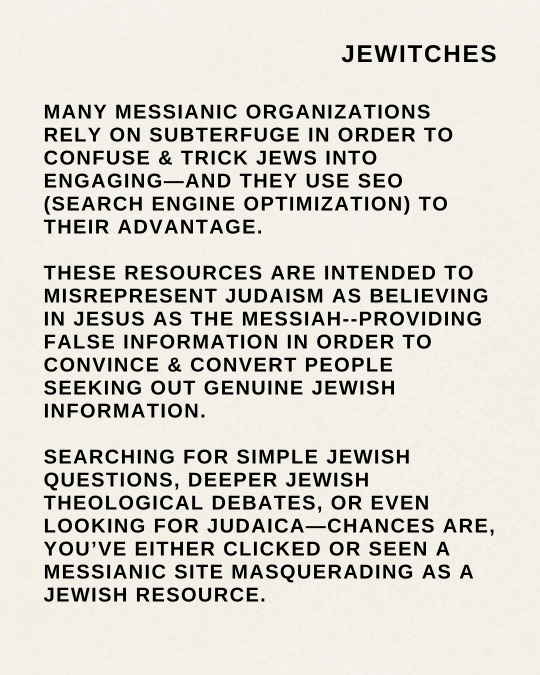
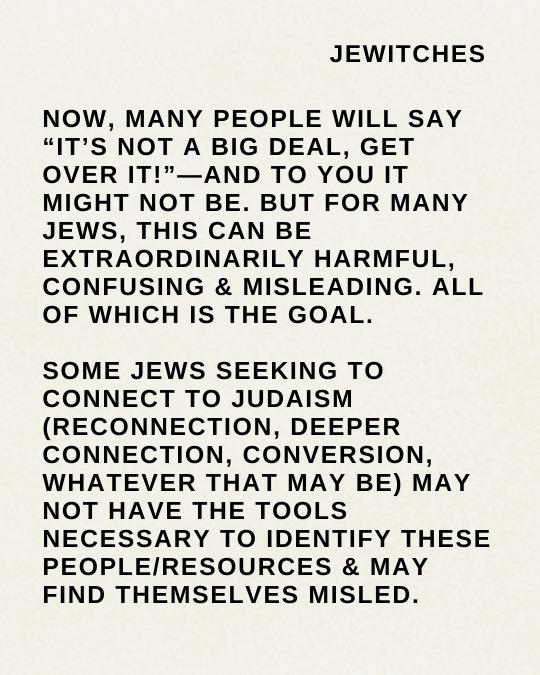
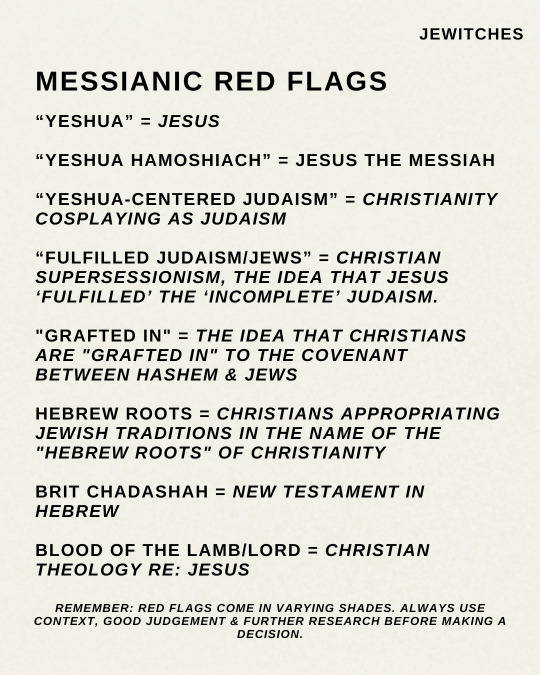


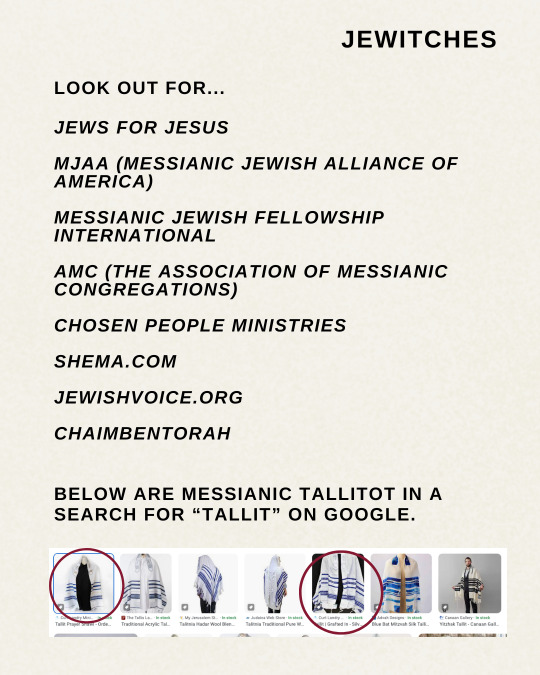
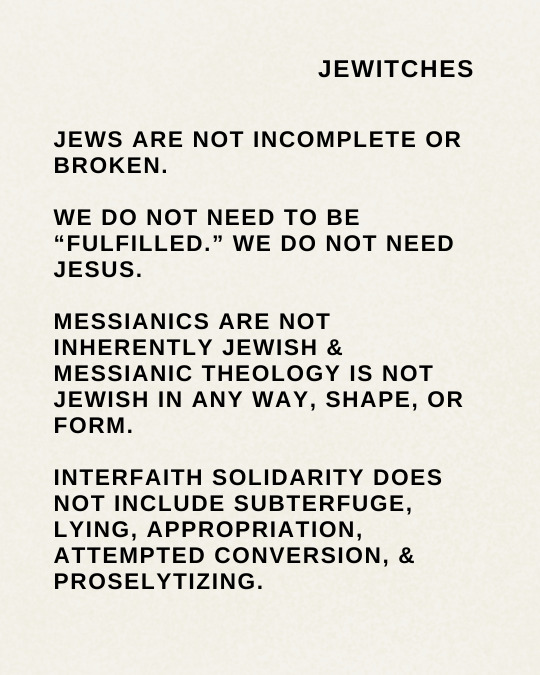
No antisemitism, bigotry, or proselytization will be accepted. We will be watching closely & utilizing the delete and block buttons as needed.
Are you unclear on the history of Messianic Christianity? Here is a resource, unaffiliated with us in any way! We encourage you to read it.
We wrote this because we’ve been caught in the trap of messianic “resources” made to trick Jews.
This post was chosen by our Patrons, who support us in the work we do. Become a Patron now.
Like we say, context is key. Jews have been using fish as protective symbols for centuries…but that isn’t the same as the Jesus fish! Red flags come in varying shades. Always use context & look for more before making assumptions.
Remember: interfaith solidarity doesn’t include coercion, trickery, subterfuge, appropriation & lying.
#jewitch#jewish magic#jewitches#jewish#judaism#jumblr#religion#messianic#Jewsforjudaism#Judaism is for Jews
3K notes
·
View notes
Text
The Creation of Man GOLBetty



Tumblr loves to ruin things, so Click for Quality!

#aria draws#digital art#digital drawing#fanart#adventure time#adventure time fanart#betty grof#magic betty#golb#golbetty#the creation of man#artistic nudity#tw nudity#tw religious imagery#I told you all I was making biblical adventure time fanart#I loooove combining my two most favorites things..... Religion and Adventure Time.....#Shout out to Betty grof for being my everything btw#fionna and cake#fionna and cake fanart#atfc#at
769 notes
·
View notes
Photo
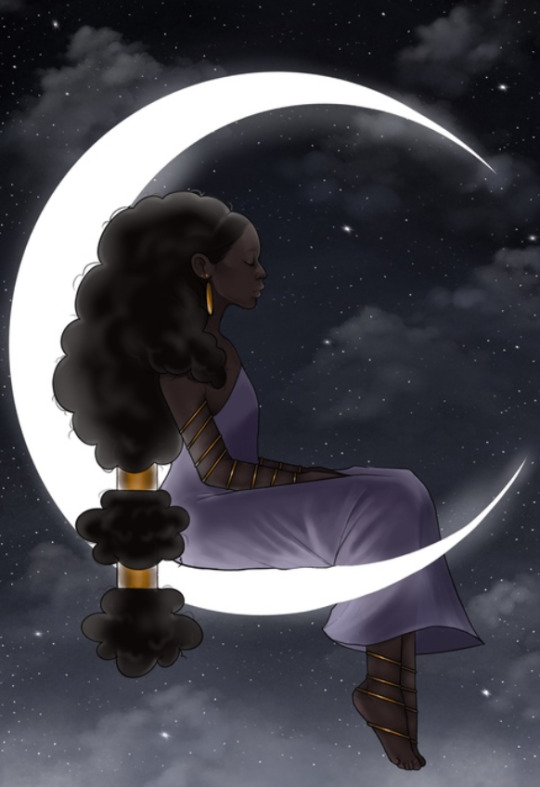
"Mawu Orisha" by Adesewa Adekoya
1K notes
·
View notes
Text
"noo but this time it's different! Our antisemitism is morally justified! We really do have a good reason to hate the jews!" - every antisemic person at any point in history.
#Israel#Antisemitism#i/p conflict#Oh? You think that because you use the word 'zionist' you suddenly magically have the moral high ground?#You think that everyone else who hated jews did it wrong but you?#You think that if you twist history and current events instead of science or religion to fit your world view then you are any better?#Give me a break#The future will remember you as just another enemy the Jewish people had to deal with#People will think of you like they think of crusaders or nazis#But hey many of you say that Hitler was right#So I don't think you would mind being packed with the nazis
536 notes
·
View notes
Text
Depicting Real World Religions Alongside Constructed Religions
Maya asked:
Hi WWC! Thank you so much for this blog, it's an infinitely wonderful resource!
Do you have any suggestions for how I can balance representation of real religions with fantasy religions, or should I avoid including these together? Does the fact that certain things bleed over from our world into the fantasy world help legitimize the appearance of real world religions?
I feel like I can come up with respectful ways to integrate representation in ways that make sense for the worldbuilding. For instance, no Muslim characters would practice magic, and both Jewish and Muslim characters would conceive of magic in ways that fit their religion (rather than trying to adapt real religions to fit my worldbuilding).
I also have some ideas for how these religions came about that fit between handwave and analogous history (though I realize the Qur'an is unchangeable, so I'm guessing Islam would have come about in the same way as IRL). BTW—I'm referring to humans, not other species coded as Muslim or Jewish. I may explore the concept of jinns more (particularly as how Muslims perceive fantastical beings), but I definitely need to do a lot more research before I go down that road!
Finally, I saw a post somewhere (*but* it might have been someone else's commentary) suggesting to integrate certain aspects of Judaism (e.g., skullcaps in sacred places/while praying, counting days from sundown instead of sunset) into fantasy religions (monotheistic ones, of course) to normalize these customs, but as a non-Jewish person I feel this could easily veer into appropriation-territory.
*One of the posts that I'm referring to in case you need a better reference of *my* reference: defining coding and islam-coded-fantasy
[This long ask was redacted to pull out the core questions asked]
"Both Jewish and Muslim characters would conceive of magic in ways that fit their religion (rather than trying to adapt real religions to fit my worldbuilding)."
Just a note that while having religion be part of magic is a legitimate way to write fantasy, I want to remind people that religious characters can also perform secular magic. Sometimes I feel like people forget about that particular worldbuilding option. (I feel this one personally because in my own books I chose to make magic secular so that my nonmagical heroine wouldn’t seem less close to God somehow than her wizard adoptive dad, who is an objectively shadier person.) I’m not saying either way is more or less correct or appropriate, just that they’re both options and I think sometimes people forget about the one I chose. But anyway moving on—
Your decision to make the water spirits not actual deities is a respectful decision given the various IRL monotheistic religions in your story, so, thank you for that choice. I can see why it gets messy though, since some people in-universe treat those powers as divine. I guess as long as your fantasy Jews aren’t being depicted as backwards and wrong and ignoring in-universe reality in favor of in-universe incorrect beliefs, then you’re fine…
"I saw a post somewhere (but it might have been someone else's commentary) suggesting to integrate certain aspects of Judaism (e.g., skullcaps in sacred places/while praying, counting days from sundown instead of sunset) into fantasy religions (monotheistic ones, of course) to normalize these customs, but as a non-Jewish person I feel this could easily veer into appropriation-territory."
That was probably us, as Meir and I both feel that way. What would make it appropriative is if these very Jewish IRL markers were used to represent something other than Judaism. It's not appropriative to show Jewish or Jewish-coded characters wearing yarmulkes or marking one day a week for a special evening with two candles or anything else we do if it's connected to Jewishness! To disconnect the markers of us from us is where appropriation starts to seep in.
–Shira
To bounce off what Shira said above, the source of the magic can be religious or secular--or put another way, it can be explicitly granted be a deity or through engagement with a specific religious practice, or it can be something that can be accessed with or without engaging with a certain set of beliefs or practices. It sounds like you’re proposing the second one: the magic is there for anyone to use, but the people in this specific religion engage with it through a framework of specific ideas and practices.
If you can transform into a “spirit” by engaging with this religion, and I can transform into a “spirit” through an analogous practice through the framework of Kabbalah, for example, and an atheist can transform through a course of secular technical study, then what makes yours a religion is the belief on your part that engaging in the process in your specific way, or choosing to engage in that process over other lifestyle choices, is in some way a spiritual good, not the mechanics of the transformation. If, on the other hand, humans can only access this transformative magic through the grace of the deities that religion worships, while practitioners of other religions lack the relationship with the only gods empowered to make that magic, that’s when I’d say you had crossed into doing more harm than good by seeking to include real-world religions.
Including a link below to a post you might have already seen that included the “religion in fantasy worldbuilding alignment chart.” It sounds like you’re in the center square, which is a fine place to be. The center top and bottom squares are where I typically have warned to leave real-world religions out of it.
More reading:
Jewish characters in a universe with author-created fictional pantheons
–Meir
733 notes
·
View notes
Photo

#witch#witchcraft#witchy#pagan#witchyvibes#magick#magic#wicca#witches#witchery#witchy things#witchcore#atheism#atheist#agnostic#antireligion#anti religion#agnosticism#godless#exchristian#anti theism#anti theist#nonreligious#non religious#religious trauma#secularism#religion#books#reddit#WitchesVsPatriarchy
5K notes
·
View notes
Text
I know some people might not like the whole “Sabine training to be a Jedi despite not being super force sensitive” thing but I honestly think it’s really cool. It’s expanding what being a Jedi is, it’s showing they’re more than just space wizards, they’re a religion, a people- being a Jedi isn’t about having powers it’s about your training and how you live your life. I think it’s very cool and I like the idea of nonforce sensitive Jedi
#Padawan Sabine is so cool fight me#Yes Jedi are a religion#Jedi as a way of life and a people not just an organization of magical beings#sabine wren#Ahsoka#ahsoka spoilers#ahsoka series#I feel like some people might just not like it because it means the Jedi aren’t “special” anymore….#dipping a toe into discourse wish me luck
622 notes
·
View notes
Text
Please intentionally attempt to see the magic in everything. Everything is magic, even if you understand the "boring" reasons why things happen. Look at the magic in growing plants, the magic of your muscles flexing and retracting, the magic of your eyes and skull, the magic of a cat's purr.
It's all magic. Understanding the "why" is just understanding what makes things magical, it doesn't change that it's all significant and magic.
#positivity#this has helped with my sense of aimlessness personally. it isn't even about belief in religion or gd or anything like that#it's about genuine appreciation and enthusiasm for the world and universe you live in#i personally always disliked the 'why feel awe about [thing] when [long technical answer about how it works]'#yes a plant grows through chemical reactions. but that's still magic. why deny yourself awe and wonder?#i can tell you the chemical reactions which make your arm flex. but that doesn't mean it isn't magic💛💛💛
178 notes
·
View notes
Text
I think the things I'm most looking forward to about the Farm, if it ever happens, are mainly twofold:
(1) Being able to have all of my Tea Cups and Tea Pots back out on display (and maybe even possible getting a China Cabinet or Buffet for them for the first time)- which also means finally getting to have Tea Parties For One again;
(2) Being able to just walk into my own back yard for any rituals I need (or want) to do, and not needing to worry about anyone seeing or interrupting me- or having to follow anyone else's "rules" about what I can and can't do with my own religious practice and when.
#ReTaming The Farm#A Dragon's Hoard Of Tea#Religion and Magic#Oklahoma#Wiccablr#Witchblr#Paganblr#Witches of Oklahoma#Oklahoma Witch#Oklahoma Witches#Pagans of Oklahoma#Oklahoma Pagan#Oklahoma Pagans#Personal#2023
9 notes
·
View notes
Text

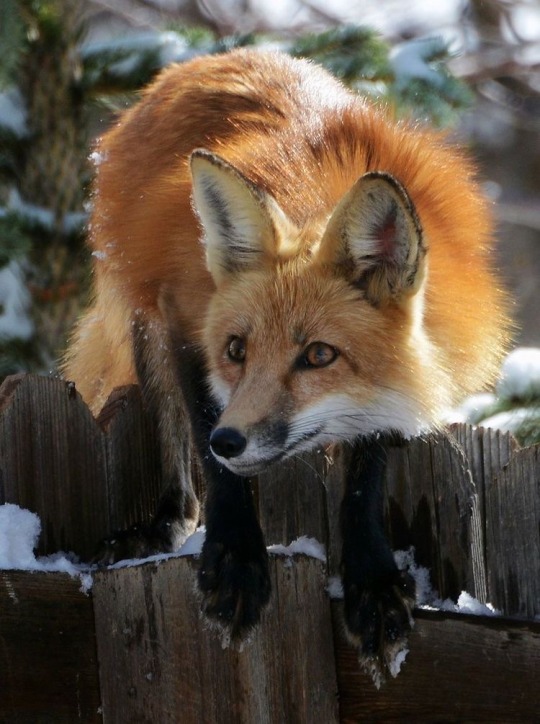


🦊🌿🪵
#familiar :: 🦊#familiar#daemon#pagan#paganism#roman pagan#pagan community#paganblr#pagans of tumblr#spiritual#spirituality#polytheism#religion#dæmon#witchcraft#witch#magic#witchblr#witches of tumblr#witch community
462 notes
·
View notes
Text
Fox Spirits In Medieval Narratives: Gender Bias
The domestic worship of the fox described by Zhang Zhuo informs us that the fox spirit occupied an ambivalent position in family lives. That foxes were enshrined in private quarters and offered food consumed by humans suggests that they participated in the family as insiders. However, their supernatural power and animal nature inspired both reverence and fear, and preserved their identities as…
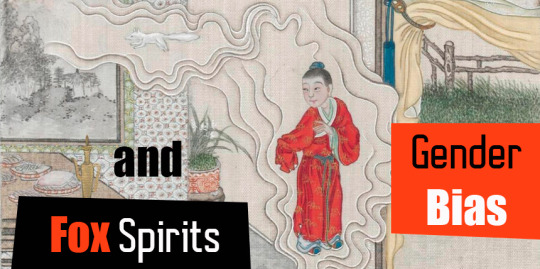
View On WordPress
#ancient China#Chinese culture#Chinese fairy tales#Chinese folk religion#Chinese history#Chinese mythology#fox#Nine-tailed fox#spiritual animal#Tang dynasty#Taoism#Taoist magic#Taoist practices
171 notes
·
View notes
Text
168 notes
·
View notes
Text
You can make your witchcraft and/or your religion(s) your whole life, or not. Nowhere are there rules for how much to practice, how much to worship. It comes down to as much or as little as you want, because it's your life after all.
#mother witch advice#religious advice#witchblr#paganblr#witchcraft#magic#religions#paganism#spirituality
299 notes
·
View notes